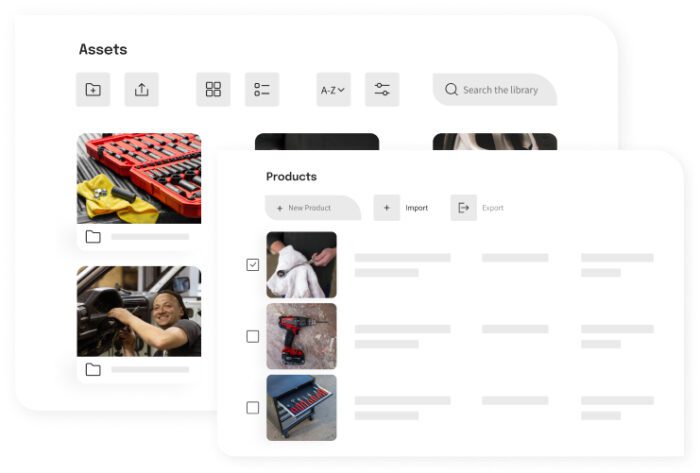Why Manufacturing Brands Need Product Information Management: 5 Key Reasons
| April 1, 2022

Manufacturing companies distribute information and products to more channels than brands in most other industries. Being able to deliver the right information and content to the right channels is at best a lot of work. But at worst? A tedious, migraine-inducing, never-ending, juggling act.
No matter the size of the company or category they specialize in, manufacturers need to manage large product catalogs with an ever-changing volume of product info and assets. With such a high volume of materials involved, centralizing product data is crucial to ensure consistency and quality across various sales channels. Organizing information is prone to errors.
If you’re part of a manufacturing brand you know how this plays out. When a new product is added, or updates are made to an existing one, a long list of detailed information needs to be created and then compiled somewhere that is organized and available for sharing. Ideally, the location this information lives is available to anyone who needs it, whenever they need it.
If you’re currently operating out of spreadsheets, shared drives, and a small collection of different platforms you know this just might not always be the case…
Life without product information management
An avalanche of spreadsheets
Oftentimes spreadsheets are a go-to for tracking and sorting information for businesses. And they work just fine. But for product information spreadsheets are lacking some important functions to make them suited to the task, highlighting the need for effective product data management.
For manufacturing companies that are working with large quantities of SKUs that often need to be updated and shared, managing it all in a spreadsheet leaves the door open to errors. Spreadsheets are also often challenging to share with other users and collaborate simultaneously.
Shared drives full of outdated material
Content entering the market with outdated or inconsistent product information is a common symptom of a manufacturer operating without a PIM, leading to significant data quality issues. Without a single source of truth to rely on, key data is ultimately pulled from wherever it can be found; the marketing team may be relying on a totally different set of records than the sales team. That’s problematic when time and money are being poured into growing a brand where consistency is a key element of success.
Relying on employees as an “agency of record”
The most challenging and risky format of them all is when a single employee becomes an “agency of record”. Relying on a single person as your source of truth is a bottleneck waiting to happen, or rather it is a bottleneck that is already happening. This can severely impact the integration capabilities of your product information management (PIM) system with customer relationship management (CRM) systems, leading to inefficiencies in workflow and customer engagement.
The top 6 benefits manufacturers gain with a PIM

A PIM platform is essential for centralizing and managing product information effectively.
1. A single source of truth by centralizing product data
With a PIM, your team has one single source of truth for your full product line and all the related product information and content. By having one universal source for materials and information, your team can trust that the accurate product data they’re sourcing and sharing is current and approved.
Updating information and managing versions becomes simplified with one location as the source of truth. This helps ensure that brand and product information is maintained throughout employee transitions or expanding product lines.
2. Streamline omnichannel delivery
When you create a single source of truth for your brand and products in a PIM, your company is set up for delivering your brand’s assets and product information to every channel in the right way.
For manufacturers, this becomes especially impactful due to the volume of sales channels needed to show up to compete in ever-growing e-commerce, retail, and market spaces. A PIM ensures easy management of all product data and digital assets for any platform, team, or partner.
3. Easier asset sharing & information distribution
How your business delivers your brand materials and product information into the right hands. This key step is especially important for collaboration between marketing & sales teams, retailers, and influential partners who are working to sell or set up your products for distribution or sales.
Without a PIM, manufacturing teams are left trying to manage and organize the necessary product information in various spreadsheets to meet every individual retailer’s requirements. This process slows down the time to delivery and generates exponential opportunities for misinformation to spread from spreadsheet to spreadsheet. With a PIM, your data, including product descriptions, is structured ahead of time to meet the needs of any retailer.
4. Put product data in context
Your team finally sells into a new retailer or lands a new contract and they’ve worked hard to gather all of the information and materials needed to get set up. They press send on the materials needed only to discover weeks later that an outdated asset or number was sent by mistake and causing inconsistencies in the way your product is described.
It’s a common error that happens when manufacturing businesses are juggling such a high volume of product information, but also one that can be prevented. With a PIM solution in place, it’s easy to deliver the correct versions of product information and assets for the specific channel needed, every time.
5. Improve your customer experience
All of these PIM benefits improve customer experiences with your brand and products by ensuring a faster time to market, the most current and accurate product information, and a more consistent brand experience at every touchpoint.
For example, an e-commerce buyer sees the right product information and product images on an e-commerce site and knows this is the right product to buy. Your competition is showing inconsistently edited images and limited or conflicting information. That’s an instant loss of trust, and interest, from a consumer’s perspective. A PIM helps to give your customers a better user experience by ensuring they have confidence in your brand and products.
Deliver marketing everywhere: More than just a PIM with digital asset management
A PIM solution is essential for manufacturing marketing teams, making it easy to update and share product information. But product visuals shouldn’t be overlooked. Without consistent, high-quality digital assets, even the best products can struggle — and how you manage those assets makes all the difference.
For brands serious about optimizing product performance, a combined PIM and digital asset management (DAM) solution is the way forward. Centralized, organized brand assets paired with always up-to-date product information offer a competitive edge that’s hard to beat.
And no one brings PIM and DAM together like Canto. Our industry-leading platform unifies the power of DAM and PIM in one solution: Canto PIM. It’s built to accelerate your entire product lifecycle — from creation to launch and beyond.
